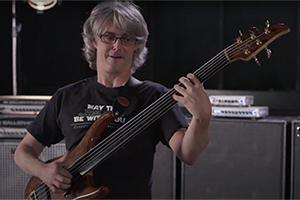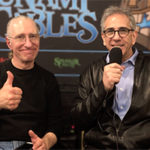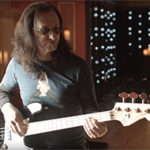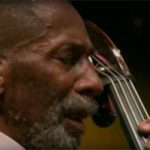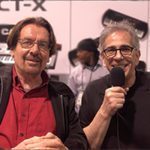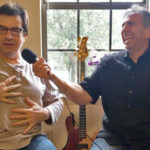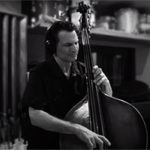Bass innovator talks influences, tuning and trying his hand at EDM
Exclusive interview with FBPO’s Jon Liebman
November 30, 2020
Trip Wamsley isn’t an easy fellow to categorize. He’s also the kind of person who probably gets a kick out of that. At times the Texas-based bassist and composer has been described as an ambient jazz artist. But while he tends to think of himself more as coming from a rock background and having a knack for improvisation, there’s no denying that he enjoys pushing boundaries.
As a former student of Michael Manring, another famously unorthodox bass guitarist, perhaps that’s to be expected. Over the years, Wamsley has been happy to dip his bass into the waters of rock, funk, experimental music, jazz and, more recently, electronic dance music. What’s more, Wamsley has been just as eager to explore the technical side of things, through an innovative assortment of techniques and special effects on both fretted and fretless basses.
In addition to playing with rock bands like Snydley Whiplash and Atomic Opera, he’s also had a full career as a solo artist, releasing his own music and playing shows around the world. Wamsley’s 2018 album, Shibboleth, found him playing alongside three drummers, with his bass and effects taking care of everything they didn’t. Lately, he’s been steadily releasing singles online.
FBPO: How did you become a bass player?
Wamsley: There was always music in the house. My mom was always playing the piano and singing and practicing some kind of German lieder or some Italian aria and accompanying herself. And then my dad is in his room, just playing the trumpet, and he’s always playing. Everybody in my house is always playing, and so they thought because I had —this sounds weird—a pretty mouth, that I was going to be a French horn player. But I decided to take up the saxophone, and I didn’t really take to that. I was quite terrible. I had two dynamic levels, triple blastissimo and parade rest, you know what I mean? When I was in eighth grade, I got a stereo for my birthday, and I bought Wings Greatest Hits and I heard “Silly Love Songs.” And I heard that burping out the speakers. And I said, “That’s what I want to do!” No, not the high sounding stuff, that boomy thing. And then I asked my dad what that was. He said, “That’s a bass guitar.” And so he got me one and brought it home with the little amp. And I hit one note and I was gone! And then I got lessons from a fantastic teacher, right from the get-go. And Mr. Mouton, he was an old Cajun fellow. He was an upright player mainly, inspired by Scott LaFaro. Then he became an electric bass player, as you did then, because he was playing upright and wanted to play in that rock and roll era. Then, all of a sudden, the Fender bass comes in and he became a Fender bass player. Right when I’d started playing, Mr. Mouton had just gotten this brand. It was ’82. He had just gotten a brand spanking new Ken Smith bass. And I’d never seen anything like it.
FBPO: Did it just have four strings? When I think of Ken Smith, I usually think of five or even six strings.
Wamsley: It was a four. I don’t think the five string was even a thing in ’82, as I recall. I never saw one until I would say mid-’80s, maybe ’85, ’86.
FBPO: Right around the time when Anthony Jackson and John Patitucci were all the rage with the sixes.
Wamsley: Oh gosh. And Anthony Jackson is one of my top five bass gods. Period. End. Do you know?
FBPO: You mentioned Wings, so I assume Paul McCartney was one of your bass influences?
Wamsley: Him and John McVie of Fleetwood Mac were the guys that caught my ear. And then after that, it was Geddy Lee, and then it was Jaco Pastorius. And then, but even more than Jaco, I remember Bunny Brunel gave a clinic in my town. And I bought the Bunny Brunel album, the first one he had out, the Touch album. And I wore that record out, man. But yeah, that was my bass bible. I still listen to it and I’m still stunned by it. And I still love it to this day, just as much as I did when I was 14.
FBPO: How did your bass career get started? What kind of stuff were you doing?
Wamsley: Well, like a lot of people, I started off with classic rock, and then I formed my own band. It was a three-piece band, and we started doing our own versions of different songs and things like that. And I cut my teeth on that. So I went from playing with some buddies in a classic rock band to forming my own band. And we were together for about seven, eight years. And we almost got signed to a half million [dollar] deal with Sony BMG in the mid-’90s, but that fizzled out. Initially I was gutted, but nowadays I’m grateful because it’s kind of like going, “I would have been a terrible rock star.”
FBPO: You are a rock star, Trip!
Wamsley: [Laughs] No man!
FBPO: It’s a good thing that we don’t have to pigeonhole musicians because it would be all but impossible to classify what you do. Everything from zydeco to hard rock, Christian rock, organic solo bass, ambient jazz. How would you describe what you do?
Wamsley: Music. Sorry. One-word answer. I’m teaching myself how to produce EDM now. I don’t know why I got bitten by that. A lot of it’s rubbish, frankly, like most genres, but there’s a few artists out there, like David Guetta’s collaborations with Sia. When I heard the song “Titanium,” David Guetta featuring Sia, I was just like going, “This is amazing!” I was in an exercise class and we were being tormented and yelled at and sweating our balls off, and that song came on, and I was like, “What the hell is that? That’s amazing!” So I started learning how to do that because I was like going, “Well, maybe I could just do an EDM track and blow some bass across it.” It’s not anything heady or sophisticated, but I’ve done heady and sophisticated. I’ve never done anything in that genre, so I’m kind of excited about it.
FBPO: What attracted you to the fretless bass?
Wamsley: Oh man, the fretless bass, let me tell you! Two bass players cemented my fate in the fretless realm. When I saw Bunny Brunel give that clinic when I’d been playing for a few months, he played this Yamaha fretless. And he had this coated fingerboard and he was jamming with Chad Wackerman. The music store in my town was a Yamaha and Slingerland dealer and Wackerman was a Slingerland artist and Bunny was a Yamaha artist at the time. And so there’s Bunny Brunel up on stage just shredding this fretless bass, sliding these harmonics all over the place, and I’m like going, “What the hell is that? I want to do that.” Now at 14, I didn’t get my first real good fretless bass until I was about 21, but then I was gone. But what cemented me [in] my final fate was when a buddy of mine played me Kate Bush, “The Morning Fog,” and Del Palmer’s fretless bass work just moved me to tears. And I just said, “Okay,” pardon my French, Jon, I just said, “Fuck it. I’m doing this.”
FBPO: You do a lot of things that aren’t traditionally done on a fretless bass, like slapping, double thumbing, tapping. I mean, when Bakithi Kumalo did that on the Paul Simon record…
Wamsley: Oh yeah, he was a great one. Oh yeah, when I heard that, that came out ’84, ’85, I was like, “Well, what the hell is this?”
FBPO: You and everyone else in the world.
Wamsley: Yeah. What was the breakaway track on that album? “Diamonds on the Soles of Her Shoes.”
FBPO: Yeah. The one with Bakithi’s crazy slap solo was “You Can Call Me Al.”
Wamsley: Yeah. But I thought that “Al” was the worst song on the record. I thought that “Diamonds on the Soles of Her Shoes” was the best one.
FBPO: Well, it got a lot of radio airplay.
Wamsley: Yeah, it sure did, but that prompted me to buy the record, and then you expand into the other tunes. And then I was like going, “Oh my gosh, this guy’s unreal.” But Del Palmer on the Morning Fog, when the little breakdown happens and John Williams takes the nylon string guitar solo and the bass just pops this lick in there. And I was like going, “That’s what I want to do.”
FBPO: Talk to me about tuning. I know you have some special thoughts about tuning.
Wamsley: Oh, boy. Well, I mean, okay. That’s one question with a million subsets…
FBPO: I interviewed Hansford Rowe a while back. He’s into something called “Just Intonation.” Are you familiar with that?
Wamsley: Yes. Michael Harrison does piano pieces that are in a Pure Intonation. And the thing is, it’s like if you take the equal tempered scale and say, “Let’s backpedal a tad.” When Bach came out with the Well-Tempered Clavier, it’s basically a commercial, a TV commercial such as it was, for a tuning system. You know what I mean?
FBPO: I’ve never heard it put quite that way.
Wamsley: Well, I mean it sounds like I’m belittling the work of Kapellmeister Bach, but I’m not. But the thing is the way that we use the tempered scale is not the way it occurs in nature. It does not happen. When you deal with Pure Intonation or Just Intonation, the harmonic series can start to regenerate itself, similar to if you’re in your backyard at night or if you’ve ever had two crickets that get in your house, somehow and they start doing their cricket thing, it sounds like a symphony of crickets because the air starts to move and the harmonic series of crickets will even regenerate itself. When I play fretless bass, and I do, say a solo piece, if you listen closely, certain things of course are going to be out of tune. But I’m always tuning my thirds and my sixes. My thirds and my sixes on a fretless bass, when I play it, are always going to be perfectly in tune. Then when I play with other people, I have to sharpen it up a little bit. You know what I mean? Especially if you’re playing with a guitar player and they’ve got a Fender Strat or a Les Paul, the harmonics on the second—I think it’s the second fret of a Fender Start, and then the harmonics on Les Paul are going to be off on the third fret a tad. And it’s just a little bit sideways. It’s like strumming the guitar and doing the cowboy C chord is absolutely tormenting to me. I don’t have perfect pitch, but I’m just like going, “God, that is whacked out, man! It’s terrible!”
FBPO: I had a band director one time who used to say, “When the bass is out of tune, the whole band is out of tune.”
Wamsley: That is correct. That is correct. Everything is from the foundation up. I could prattle on this for hours. But when you get into the different tuning, like Pure Intonation and Just Intonation, man, the music is so much fuller sounding, especially when you get into microtonal music, that is another compelling force.
FBPO: To our Western ears, it sounds out of tune.
Wamsley: Right. But it isn’t.
FBPO: Right.
Wamsley: That’s the thing. It isn’t. We’ve just been conditioned to a certain thing.
FBPO: What advice can you impart to somebody who wants to learn to play the bass? What do you think is important for them to know?
Wamsley: Man! First of all, as Ron Carter said in an interview that I memorized years ago, “When you’re first starting out, find a good teacher, period.” My father’s friend, Jerry Mouton, who I took lessons from, man, he taught me the proper fingerings from the get-go. And he was a nice man, but he was just an absolute stickler for it. And God bless him for it. Find a good teacher, period, who teaches you the fingerings and the fundamentals of great technique. That is so critical. You need to have a good fundamental technique. Jeff Berlin is a good compass for that with just the regular two-fingered technique on the right hand, and decent and good muting, resting that thumb on the E string. When you leave the E string that thumb goes down on the E, and then you’re learning proper rest strokes where you’re kind of moving through the string, coming to the next adjacent string. You know what I mean?
FBPO: I know exactly what you mean.
Wamsley: Because a lot of new bass players will do a classical guitar [move], what’s called free stroke. And they’re kind of pulling away from the string, but that only works if you’re doing double stops and triads and things like that. That is important.
FBPO: Tell me about your gear, Trip. What do you play?
Wamsley: Oh, my God. To make a long story short, my gear, I have three Alembic fretlesses. Two are five strings. One is roundwound strung with a high C, the other is strung with some flats with a low B. And the other’s a four-string strung with some nylon tapewound strings. And then I have an old Aria SB-1000 that I modified with a Rautia retrofit MB-1E pickup. And that’s my main fretted bass, because it’s kind of like a Music Man on steroids now. As far as amplifiers, I have a variety of stuff because I’m a recording enthusiast. So one brand of amp, one brand of speaker, just doesn’t work for me. But my heads are as follows: I’ve got a GK 800RB that’s one of my favorite heads, I’ve got a GK MB Fusion 500 head. This is my lightweight favorite. It’s got a nice color to it with that little tube preamp. Then I have a Mesa Boogie D-180 that I restored myself. I recapped it and retubed it and things like that. And I have a few bass cabinets from Glockenklang, from Gallien-Krueger, and some no-names that somebody tinkered together that have these no-name fifteens in them that sound perfectly shitty great, if that makes any sense, crappy great. For recording preamps, I’ve got some Brent Averill 312A’s, one with an Avedis 1122 Op-Amp, one that’s got a 1731, and I’ve got a Brent Averill Neve clone 1073, and I got a Warm Audio Pultec EQ, and things like that. And then my perfect crappy preamp that I love is this cheap Yamaha MG06 Mixer. I like that for when I want to do low-fi stuff, because you can screw up the preamps in them, and they fuzz out and I can do my MonoNeon impression.
FBPO: What’s keeping you busy these days?
Wamsley: What keeps me busy these days is being a husband and a father and a friend and a musician. I’m doing a lot of recording. I put out a record—I believe a couple of years ago—called Shibboleth, and I’ve been doing a single per month, so I’ve got two new songs that are up on Spotify, the usual streaming services. And so I’m primarily recording and I’m starting to get back into the solo bass because I had to take a break for a while because my son was young and I just wanted to be a dad. You know what I mean?
FBPO: Oh yes.
Wamsley: So I do a lot of that. I do a lot of session, cybersession work, where you get the money through PayPal.
FBPO: Primarily with fretless, or not necessarily?
Wamsley: Whatever the song calls for. I’ve been doing a lot of fretless work lately. That’s kind of surprising because the fretless is not really that prominent anymore. Some people get a little snowflakey about it going, “Oh my God, he’s going to be Jaco tonight.” “No, relax.” But yeah, so, I’ve never—you know, the fretless bass is really peculiar in that the community of fretless players. I have never met a brother or sister of the fretless clan who’s a slug or a dullard or boring. They’re all very colorful, insightful people. And we all just share this musical bond. I guess, you know, how somebody would feel if you’re in the Marine Corps or something. There’s this peculiar bond.
FBPO: What would you be if you weren’t a bass player?
Wamsley: Man, my first dream was to be a Navy pilot, but I had corrected vision. If I had my dreams of something, I wanted to be Top Gun. I wanted to be Iceman and Goose. I’d have loved to be involved with the space program or been a fighter pilot.
See Jon’s blog, with key takeaways from this interview here.
